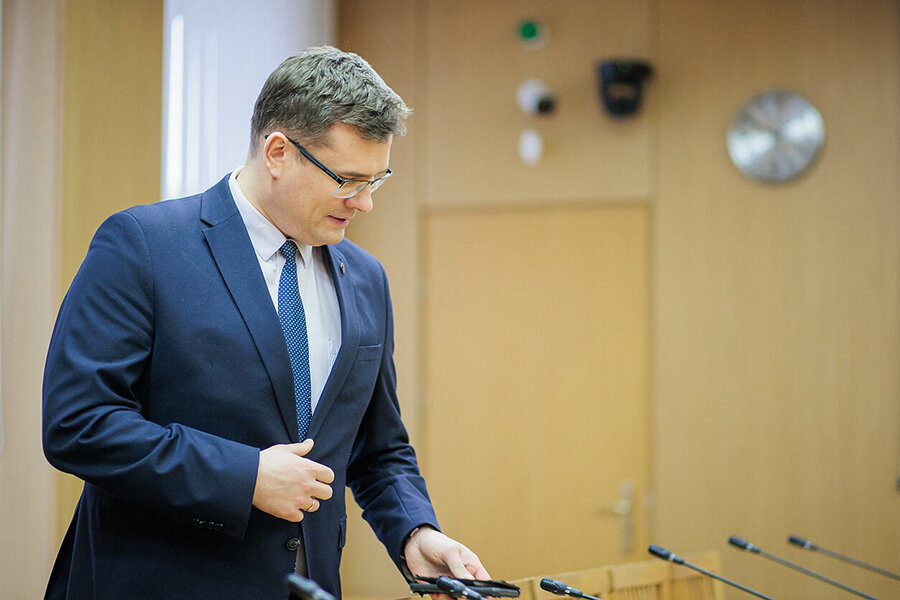Lithuania Proposes Language Exam for Temporary Residence Permit Renewal

Photo: LRT
Lithuania may soon change the rules for renewing temporary residence permits, LRT reports. Interior Minister Laurynas Kasčiūnas has announced plans to introduce amendments requiring foreigners to demonstrate knowledge of the Lithuanian language.
Currently, language proficiency is only required when applying for permanent residence. Foreign nationals living in Lithuania for under five years can renew their temporary status without any language requirement. The new proposal would make at least basic Lithuanian mandatory at the first renewal stage. Kasčiūnas emphasized that the goal is to ensure real integration and “respect for the country where they want to live.”
The minister pointed out that many foreign residents, particularly those working in the service sector, do not speak Lithuanian. This creates barriers in accessing basic public services and in daily communication. He clarified that this is not about excessive requirements — basic ability to communicate with a doctor or official will suffice. “Speaking Lithuanian is not an extraordinary demand,” he added. “It’s a matter of respect and social adaptation.”
A transition period is planned. Foreigners would receive support in learning the language before the law takes effect. Proposed solutions include free courses funded by municipalities or employers. The exact model has not yet been disclosed, but the minister stressed the need to offer real preparation opportunities.
The initiative comes amid broader national debates over the role of the Lithuanian language. Earlier, the Education Ministry proposed delaying the implementation of a rule that would require all public services to be delivered only in Lithuanian from January 2026. Parliament also debated mandatory language learning for recipients of temporary protection, though it was proposed to delay that requirement until after three years of residence.
It is still unclear whether Kasčiūnas’ proposal would apply to all TRP holders, or only to specific categories — such as those holding residence based on employment. The required level is also not finalized but is likely to be basic (A1–A2 under CEFR). Even such a threshold could present a barrier for some migrants, particularly from countries with limited access to Lithuanian language instruction.
A related potential policy under discussion is restricting job changes after obtaining a residence permit — part of efforts to enhance migration transparency. If both proposals move forward, they would significantly increase control over the mobility of foreign workers in Lithuania.
As of early 2025, approximately 180,000 foreigners hold temporary residence in Lithuania, most of whom are from Ukraine, Belarus, Uzbekistan, Tajikistan, and Russia. The proposed reform could impact tens of thousands who have never before faced language requirements. However, the government insists the aim is not to limit immigration, but to build a sustainable integration model.
The bill is expected to be submitted to the Seimas by late July. If approved, the changes may take effect in 2026. Authorities stress that the policy will be supported by outreach efforts and programs to assist foreign residents in learning the language and adapting to the new rules.
It’s worth noting that since May 3, 2025, Lithuania banned frequent travel to Russia and Belarus. Foreign nationals may lose their Lithuanian residence permits if they’ve visited either country more than once within a three-month period — unless justified by exceptional reasons such as illness of close relatives or cross-border work.
On these grounds, Lithuanian authorities have already revoked the residence permit of one Russian citizen. The Migration Department is currently reviewing the status of 34 others. In 30 cases, revocation procedures have begun. Since the rule was introduced, 292 border crossings to Russia or Belarus have triggered alerts — but most cases involved legitimate justifications.
In 2024 alone, Lithuania revoked over 24,000 foreign residence permits. Amid regional geopolitical instability, further legislative tightening is under consideration.
Read also:
Lithuania Freezes Russian and Belarusian Bank Accounts: New EU Sanctions 2025
Lithuania Sets Record-Low Work Quota for Foreigners in 2025
Number of Ukrainians, Russians, and Belarusians with Residence Permits in Lithuania Falls Significantly
Life and Cost of Living in Europe in 2025: Complete Guide
Business Visas in Europe: Where It’s Easiest to Launch a Business in 2025








